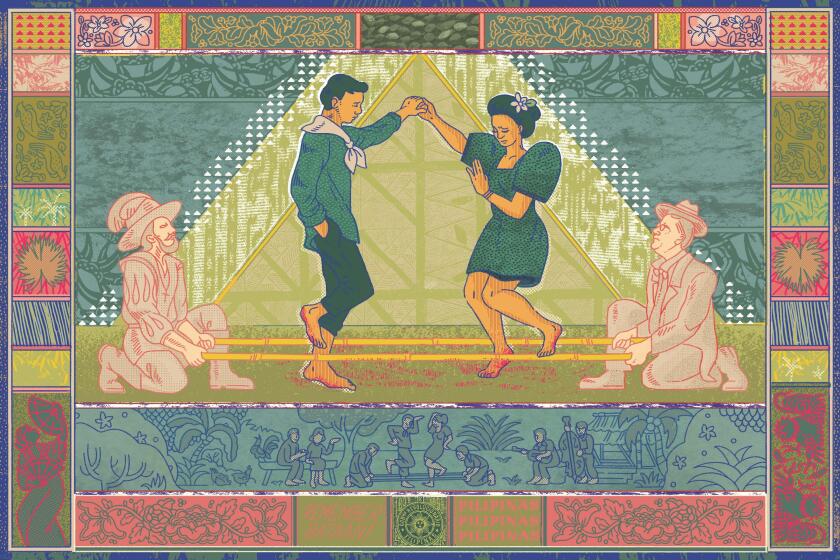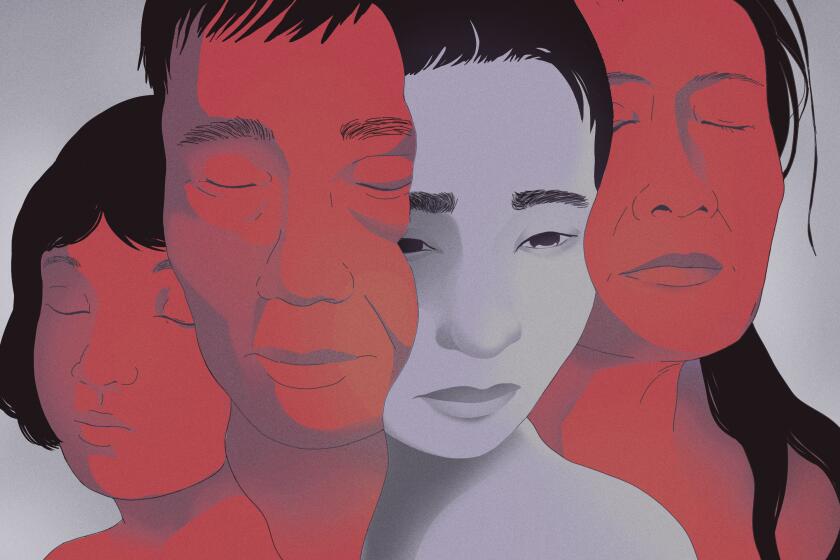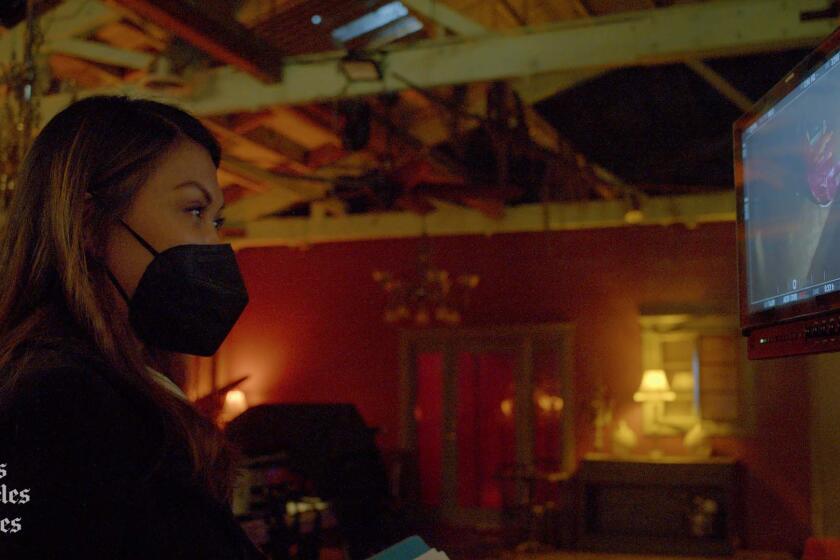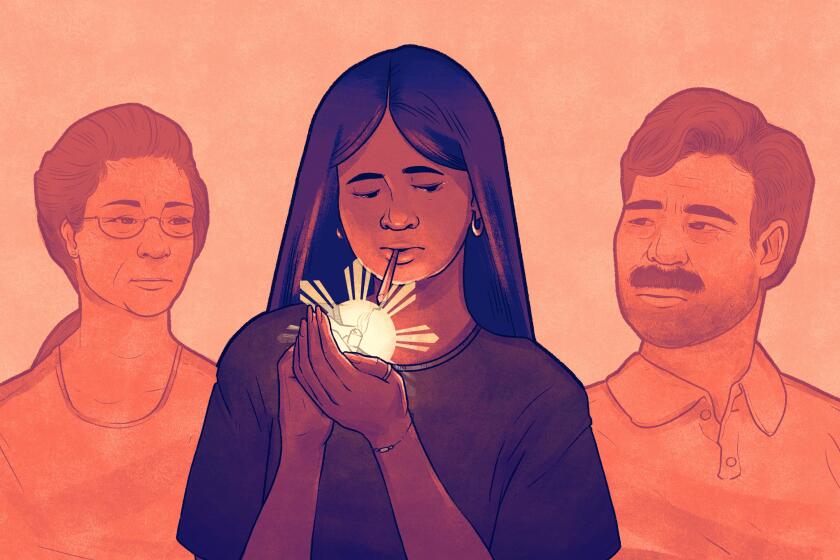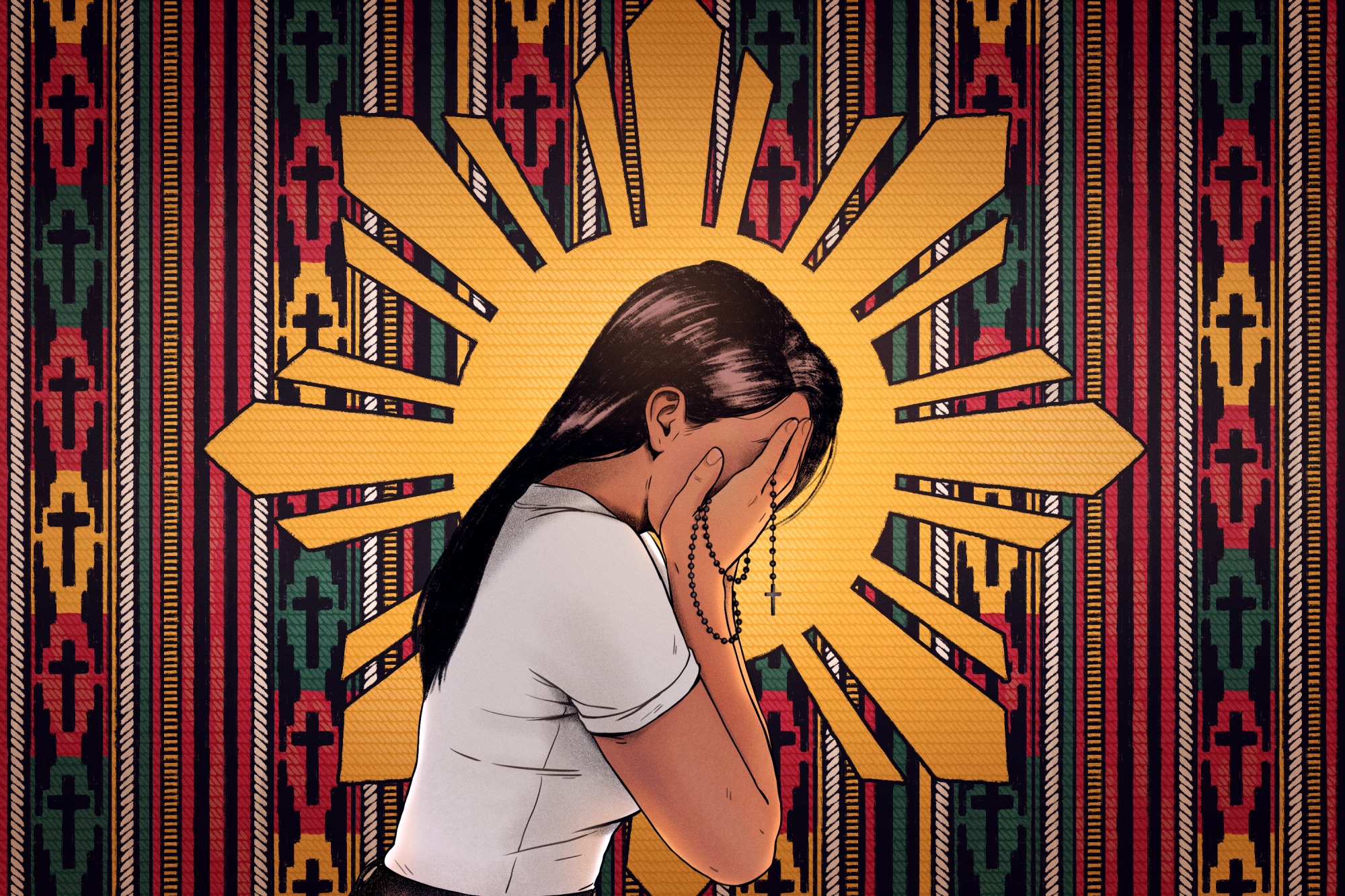
- Share via
Father Rodel Balagtas sees it across the Roman Catholic churches he visits in the archdiocese of Los Angeles: A significant number of the parishioners who fill the pews are Filipino Americans.
Balagtas is the priest liaison for the Filipino Ministry of the Archdiocese and pastor of Incarnation Church in Glendale, which holds five Masses on Sundays.
“If not for the Filipino families in Glendale, we’d probably only have two Masses on Sunday,” he said.
Father Perry Leiker, pastor at St. Bernard Church, estimates that nearly half of the Glassell Park church’s parishioners are Filipino American.
“They’re just very expressive of their faith and very proud of their faith, and I think they find a lot of support in their faith,” he said.
For many Filipino Americans, their cultural and religious identities are closely intertwined. Surveys have shown throughout the years that more than 80% of Filipinos in the Philippines are Catholic. Meanwhile, 65% of Filipino Americans identify as Catholic, according to a 2012 Pew Research report.
This is a collection of articles about mental health in the Filipino American community and the factors that influence it.
Catholicism was mentioned often in discussions and interviews with people who spoke with The Times for its Filipino American mental health series. The majority of participants in focus groups for the series identified as second-generation, born to immigrant parents. A common experience that emerged was guilt and shame associated with their faith and culture. Yet many also said that their faith was instrumental in assuaging difficulties they encountered in their lives.
“Every value has a light side and a dark side — like the Force,” said Christine Catipon, a staff psychologist at Stanford University Counseling and Psychological Services. She holds a master’s degree in spiritual psychology and is a practicing Catholic — although she has become less devout than she used to be after recently coming out as pansexual.
“A challenging part of Filipinx mental health and faith traditions is our culture is so intertwined with Catholicism and Christianity that it’s kind of hard to know: Is my guilt coming from the Catholic faith? Or is it coming from my Filipino [cultural] values? Or is it coming from my family that believes in both, and it all just kind of gets mixed together in this weird way that people can’t navigate?”
The faith tradition has a long history in the Philippines that dates to the 16th century. E.J.R. David, a professor of psychology at the University of Alaska at Anchorage, wrote in his book “Brown Skin, White Minds: Filipino -/ American Postcolonial Psychology” that the pervasiveness of Catholicism is rooted in Spanish colonization of the country.
David wrote, “It took Spain approximately 50 years to quell the indigenous Tao’s opposition to Spanish rule and cultural transformation.” He also wrote that Catholicism was one of the primary tools used to convince the Tao that their way of life was inferior to and less civilized than the Spanish.
Filipino American cultural values contribute to a strong sense of community but may also lead to nuanced challenges when navigating depression, anxiety and suicidal ideation.
Catholicism practiced by Filipinos today incorporates unique traditions, which include Simbang Gabi, a devotional nine days of Masses leading up to Christmas; Pabása, the singing of the Pasyon during Holy Week; and the predawn Salubong, which celebrates the resurrection of Jesus Christ on Easter morning.
Balagtas noted some key practices that, while not unique to Filipino Americans, appear stronger among Filipino American Catholics: strong Marian devotions, love for the Santo Niño and Marian images, a devotion to the crucified Christ, and the offering of Masses for the dead and sick because of a strong belief in the power of intercession. Saints are viewed as members of the family, which reflects the high value the community places on family.
“Theologically, it seems like we connect to Christ because of the suffering and colonialism that we underwent,” Balagtas said. “So we are more attracted to the suffering Christ than to the risen Christ.”
Community members and faith leaders who spoke with The Times illustrated a generational divide. Priests note that the majority of Filipino American parishioners are first-generation immigrants along with their young children. They don’t see as many second-generation Filipino American parishioners — particularly those in their 30s and 40s — at church.
The second-generation participants in The Times’ listening session chronicled a common faith journey of being raised Catholic in the United States. Many came to a pivotal point in their life when they questioned their faith. Some have left the religion completely, while others have maintained certain Catholic traditions.
Jeff Genota, 34, a Los Angeles resident, was raised Catholic. He was baptized in the church, attended Catholic school, went to Mass and relied on prayer and reading the Bible to get through high school. But he said his experience has often been hurtful — especially within the Filipino culture.
He remembered being viewed as someone who brought shame to the family because he didn’t want to participate in family prayer. Refusing to do so reflected a lack of family loyalty. He also said his family sometimes made claims that God wouldn’t bless the family if they didn’t pray together.
Tess Paras has learned how to make her depression and anxiety work for her as Filipina American actor, director and producer in Hollywood.
Jamie Borromeo, a 37-year-old Chino Hills resident, said she’s debating whether to pass down Catholic traditions to her children. Her experience with Catholicism was colored by guilt and a decrease in self-esteem.
She felt so guilty about disobeying her parents and elders that she brought it to confession on a weekly basis when she was a teenager. Honoring your mother and father is one of the 10 Commandments, she pointed out. She also felt like it was a sin if she didn’t put her family’s needs before herself.
“The things that I do are for my daughter, it’s for my husband, it’s for my family, it’s for my work — it’s for everyone but me,” she said. “And I think what the guilt and shame teaches you is that everything [else] is more important than you.”
Catipon said guilt and shame can lead to multiple mental health concerns, including despair, anxiety, depression and negative self-esteem. She added that anxiety and sadness can often be based on thoughts that may not be true — such as someone believing they are a “bad person” for various reasons that could be influenced by cultural values and religion.
“For example, I was raised that you don’t date until after you graduate from college. And then you graduate college — why aren’t you married yet?” Catipon said. “So of course, a lot of us snuck around.”
She said clients who have lied to their parents often expressed guilt, which she has challenged through the lens of faith.
“I’m like, according to who? Does it say in the Bible that you’re a bad daughter because you snuck out to see your partner?”
Southern California mental health resources for Filipino Americans
SIPA (Search to Involve Pilipino Americans)
(213) 382-1819, Ext. 125
Center for the Pacific Asian Family
(800) 339-3940
APAIT Health Center
(213) 375-3830 (L.A. office)
(714) 636-1349 (Orange County office)
OCAPICA (Orange County Asian Pacific Islander Community Alliance)
(714) 636-9095
Pacific Asian Counseling Services
(310) 337-1550
Change Your Algorithm
(323) 663-8882
Some second-generation Filipino Americans also said that in the face of difficulties, they’re told to pray harder — or that they may not have been praying hard enough.
Catipon said these types of statements are dismissive and minimizing.
“The challenging part of faith with mental health is that many people who are raised devoutly have come to believe that God is the answer for everything,” she said.
“What if that person has been praying nonstop 24/7, and then being shamed for not praying enough?” she continued. “We don’t know what that person has been doing or going through. And praying is not enough. Action is what changes people’s lives. Absolutely pray, but then also be open to the fact that we don’t know God’s plan.”
Much of Catipon’s job as a therapist is helping clients find a middle ground among “the gray,” as she calls it.
“Unfortunately, many values are interpreted as extremes,” she said. “Like, you have to do this and follow this 100% or else you’re a bad person, you’re a failure, etc. And that’s just not possible.”
Other Filipino American Catholics who spoke with The Times described experiences where their faith was a positive influence on their mental well-being.
Joe Nava, 38, a Texas resident, said he found solace in his faith during challenging times in his life — when he and his wife endured a miscarriage and when he was diagnosed with bipolar disorder.
“As much as that suffering was, there still was a lot of deep, deep growth,” Nava said. “And it didn’t stop us from praying.”
He added that he doesn’t believe it’s possible for anyone to pray their way out of anxiety or depression. Therapy gives him the tools to counter imbalances and behaviors associated with bipolar disorder, while prayer helps him practice gratitude and deepens his trust in God.
Mitch Lozada, 37, a Las Vegas resident and staff sergeant in the Air Force, has found it helpful to surrender his problems to Jesus. That isn’t to say there’s no place for some of the pillars of mental well-being, he said, like exercise, talking with friends and seeing a therapist. But in moments when he’s deployed to hostile environments, he leans on prayer to eliminate any anxiety he’s facing.
“For me, I find a lot of comfort and a lot of grace knowing that Jesus essentially died for our sins,” he said. “And anything that we bear in life, he has borne for us. That the cross that we carry is a cross that we don’t carry alone.”
The impact of the value placed on Eurocentric features, such as lighter skin, in the Filipino community is one of the most prominent examples of the impact of the Philippines’ colonial history on Filipino American mental health.
Father John Cordero is the pastor at Holy Family Catholic Church in Artesia, where he estimates that more than 80% of parishioners are Filipino American. He is also a member of a Filipino religious congregation called the Marian Missionaries of the Holy Cross. When it comes to the church’s role in mental health, he said contemplative prayer is a practice his church promotes because it has a positive impact on mental health.
“When you do these spiritual practices, you’re able to rewire your brain to counter the negative effects of anxiety and stress,” Cordero said.
He said he’s aware of mental health issues among Filipino American parishioners — and that some say they have been negatively affected by their experience with Catholicism. This may have been due to “a faulty transmission of the content of the faith,” he suggests, such as an overemphasis on guilt.
“Of course, that messes people up,” he said. “We have to rethink some of the practices when it comes to catechesis because we forget about the truth about the love of God. We focus on our sinfulness, we forget the main message of the gospel, wherein God loves us. And of course, that is something that you experience in contemplative prayer.”
The hope inherent in faith can provide a sense of purpose for someone with depression or anxiety, Catipon said. She has seen faith serve as a protective factor for her clients who experience suicidal thoughts: They won’t commit suicide because of their religious beliefs.
“I think when we don’t have something to believe in, it can be a little harder to believe that there’s something better out there,” she said. With clients, “If [faith is] a very strong coping strategy for someone who is struggling, I will absolutely use that.”
Research on substance use among Filipino Americans is sparse. Along with treatment, talking about it is an important step in helping people recover.
When it comes to addressing mental health at the intersection of Filipino Americans’ cultural and religious identities, Catipon referenced a study published earlier this year in the Asian American Journal of Psychology that offers insights to potential solutions. Researchers found that Filipino American Catholics seek support from family, friends and faith — in that order.
Participants in the study also revealed that they wanted more culturally sensitive mental health settings that incorporate their Catholic faith.
Catipon said it’s important for mental health providers to acknowledge the role faith and spirituality play in people’s mental health — and that they’re factors that contribute to intersecting identities in the same way that gender, race, sexuality, socioeconomic status and culture do.
Catholicism plays an important role in Filipino American mental health, she said. “That’s their culture. Whether or not they practice it, they’ve been imbued with it.”
Balagtas said the church can do more to address the faithful’s mental health needs.
Suicide prevention needs much more education and attention, he said. He hopes to establish a mental health ministry at his church, though he acknowledged several challenges. Faith leaders often aren’t trained to deal with mental health issues, he said, and there is stigma tied to talking about mental health at the pulpit — or even with or among parishioners.
But he believes parishioners will trust the church to help with mental health. He also thinks churches and parishes should establish support groups for families dealing with issues as wide-ranging as ADHD, anxiety, schizophrenia and bipolar disorder.
“I think it’s important for the church to see that God is giving,” Balagtas said. “Psychology or therapy are also ways God is giving support. So it’s not against our faith. Those are gifts from the Lord.”
More to Read
About this story
Illustration by Alycea Tinoyan. Art direction by Nicole Vas and Jim Cooke. Audience engagement by Maneeza Iqbal. Listening sessions facilitated by Constante, Ada Tseng, Karen Garcia, Jonah Valdez and Matthew Ballinger.
Sign up for The Wild
We’ll help you find the best places to hike, bike and run, as well as the perfect silent spots for meditation and yoga.
You may occasionally receive promotional content from the Los Angeles Times.
